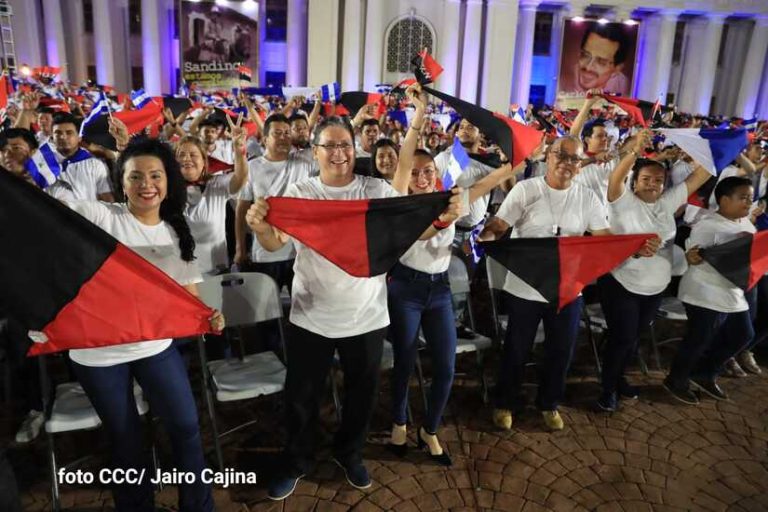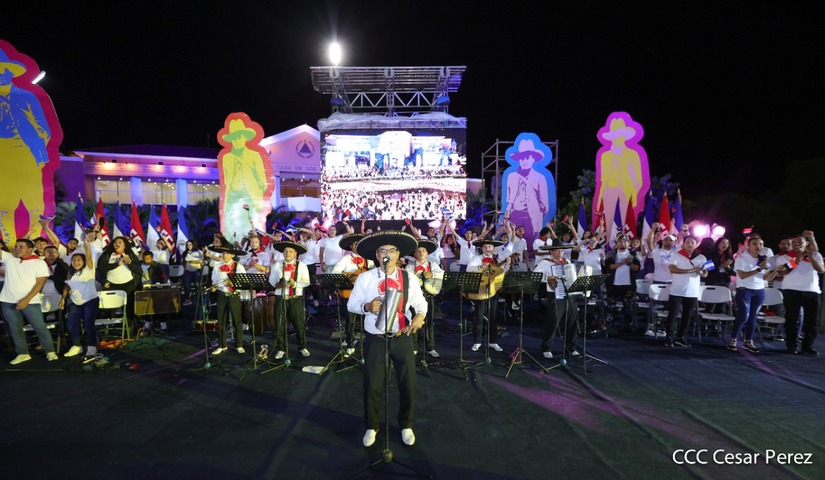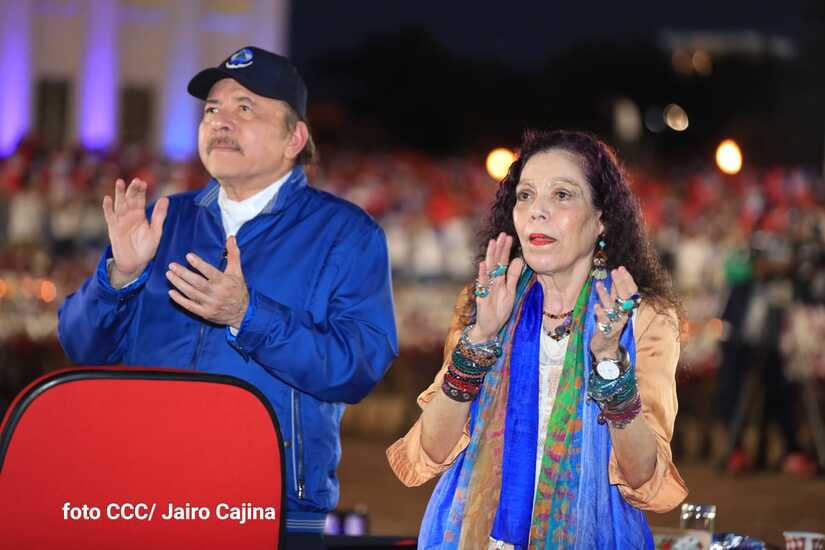18 de julio 2023

Children of Exile: The Births “Sowing Hope” in the Camp of Nicaraguan Farmers

PUBLICIDAD 1M
PUBLICIDAD 4D
PUBLICIDAD 5D
"Of the 100% of those convened, 90% of us are forced to go. Every Saturday we have to go on their walks and they take attendance", says a doctor

Some of the Ortega supporters who were selected and taken to the celebration of July 19, 2022. Photo: Presidential Office
"Maria", 34, is preparing orders at the small food stand where she makes her living in Nicaragua. She doesn't have time to answer the question about what she thinks of Daniel Ortega and his family on this evening of hectic hustle and bustle. She attends to the customers who arrive attracted by the scent of freshly made food, a variety of options that include beef, roast chicken, gallo pinto (rice and beans mix) and fried cheese.
It's been five years since María has been able to work at her profession as a public accountant, when in December 2018, the Ortega-Murillo regime began the closures of the non-governmental agencies where she used to work. "It has become difficult for me to find employment," she laments.
For this professional, economic survival occupies her daily agenda, relegating any other type of topic, such as the commemoration of the fall of the Somoza family on July 19, 1979, to the back burner. It is a national holiday that has been turned into a partisan act by the ruling family, a family that has emerged as a new dictatorship with its 16 years in power, the third longest in Latin America, behind Cuba and Venezuela.
"The truth is it's a date that currently has no relevance at all. Not even the most 'enamored' of the government party are showing any excitement," says María who describes the party's festivity as a "carnival," in reference to the rides and games at local county fairs. "Before, the preparations were taken seriously and you could feel the devotion to the date in the atmosphere. That's not happening any more," she says.
María's perception contrasts with the state propaganda that kicked off "victorious July", emphasizing that they were on track for the celebration of 44/19, in reference to the 44th anniversary of the triumph of the Sandinista revolution. Since 2019, the main event has not been organized to have massive participation of sympathizers, in response to the increasingly noticeable deterioration of the political base of the regime that holds on to power by force.
"Every July there will always be the 19th, with the strength of the victory, hand in hand with God," said Rosario Murillo on July 1, 2023, kicking off a series of party activities in the main provincial capitals of the country. Among the activities are public "walks" by public employees. Government workers are under political surveillance and are subject to pressures from party leaders who extend their watch from government institutions out to local neighborhoods.
Since 2018, economic survival and mass migration ⎼also a result of the political crisis brought about by state repression that left hundreds dead⎼ is the reality for Nicaraguans. Official data confirm their concern that Nicaragua is a country in crisis with no possibility of a future.
The minimum wage approved in 2023 is just under 7,800 córdobas (approximately $216) a month, covering about 40% of the cost of the basic basket of 53 products, according to information from the governmental Nicaraguan Institute of Development Information (INIDE).
CONFIDENCIAL interviewed four citizens living in Nicaragua, who requested anonymity to be able to state their views about July 19th, the erosion of the FSLN's political base, and the level of disapproval of Ortega and Murillo's administration.
"Guillermo," an 80-year-old retiree who supported the FSLN earlier in his life, before Ortega's rise to power in 2007, says the population's discontent is explained by an economic crisis that remains chronic "despite the fact that the government has done a lot of things: roads, parks and stadiums."
"There is a crisis that has not yet imploded, it's more like it's folded in on itself, but there it is. Sometimes I see that people criticize those who go to concerts and those who fill the bars, but I think it's a way to escape the anguish and anxiety that people feel," added the retiree, who considers that older FSLN militants point to Murillo as "the problem" and "talk bad about her."
"They have already started to put up the awnings around the Plaza, but you don't see any movement of people. Lately they have not celebrated July 19 in the Plaza. They've done it other ways. Every day the number of people that support them is smaller. They don't have the capacity to keep a hold on so many people," said Guillermo, a resident of Managua.
Migration is another important factor in any political analysis. According to data from the Migration and Remittances program of the Inter-American Dialogue, a think tank based in Washington, DC, there are some 1.27 million Nicaraguans outside the country, representing 18.5% of the current population.
Junieette Brenes, 38, a UK-based dissident of the ruling party, argues that the "blindfold fell off for many FSLN sympathizers in 2018," when the massacres occurred. Today she thinks that the negative opinion of Ortega seen in the national polls is similar to the view held abroad, of a dictator characterized by corruption.
"There is despair in Nicaragua. People don't trust the Ortegas, but they are clear that they are going to remain in power and that democracy is not coming soon. I am also very concerned about the lack of confidence in the opposition," said Brenes, who sees the FSLN as a different party than the one she was "presented with" when she was a member.
For Brenes, the FSLN is the cause of enormous damage to the population. Starting when she was seven years old, she used to organize the party's cultural activities in her neighborhood, Monseñor Lezcano. She was a member of the Sandinista Youth, and later participated as a poll watcher for organizations allied with the ruling party at voting sites. She also made house-to-house visits to "raise awareness."
Brenes worked in the judicial system, and it was there that she began to see things that did not seem right to her. She is the daughter of political prisoner Hugo Brenes, a former military officer who refused to repress the population in 2018. She has been the target of threats from Sandinista fanatics because of her criticisms of the executive branch.

For Nicaraguan political analyst Manuel Orozco, director of the Remittances program at Inter-American Dialogue, the July 19 celebration can be seen as a "denial of what is there," but it continues to have a useful double meaning for the leadership of the organization: the national holiday as well as a cult of loyalty to Orteguismo.
"[The celebration] is a mechanism to measure the political climate within their bases. I have been observing them and what I have seen is that the pro-Ortega media types have less audience. This is my own empirical observation, but I've watched systematically every other day for the last two years. If I were to put a number on it, the audience has declined from 500 regular followers to 250. Second, the comments of support for Ortega or the party have declined substantially," explained the political analyst, speaking from Washington, DC.
In an opinion article, Orozco analyzed the results of the June 2023 CID Gallup poll, sponsored by CONFIDENCIAL, which revealed that only 13% of Nicaraguans support the Government party. Orozco considers that this shows that the party base is not cohesive and is showing clear signs of dissent and dissatisfaction.
"I'm seeing that if the economic arena isn't working for them, the international arena isn't working either, and their circle of power is shrinking. What is lagging behind is the cohesion of the democratic civic group," lamented Orozco.
For feminist and former political prisoner Tamara Dávila, deported last February to the United States along with 221 prisoners of conscience, the Ortega regime is in decline.The economic and social situation of Nicaraguans has also uncovered the lie of the official narrative that the country "lives beautifully," and in reality, prosperity is only notable for those close to Ortega.
"Daniel Ortega and Rosario Murillo are not dealing with the problems the population is facing: food, job opportunities, health, welfare, and they are not responding to people's need for security," said Davila.
According to the feminist, the attrition in the FSLN is explained by the fact that people do not see any benefit in belonging to the ranks of an organization in which even local decisions are subordinated to Ortega's inner circle.
Dávila listed the most urgent problems of the population: the tables in their homes are increasingly lacking food; there is no work, and if there is work it's precarious; it's more difficult for children to go to and stay in school; and access to health care is also more difficult.
"Heberto" shares many of these ideas. He is a medical doctor. Seventy percent of his salary is spent on living expenses and he says that every day his paycheck "covers less and less ven though [his] family isn't very big."
In addition to this crisis of lack of economic resources, Heberto also suffers from the paranoia of the authorities who persecute any criticism in government institutions. "The Ortegas themselves and their faithful followers are paranoid. That can be seen in their events and monotonous marches.... Of the 100% of those convened, 90% of us are obligated to go, because every Saturday we have to go on their walks and they take attendance, and they tell us that we can't be absent more than three times," he explained.

Those carrying out the persecution are the unions of the Federation of Health Workers, led by the president of the National Assembly, Gustavo Porras, one of the main operators of the presidential couple.
When "Heberto" is asked about what might be the FSLN's main mistake that explains its collapse in the polls, his answer is blunt: "Being cynical, shameless, hypocrites."
In the same vein as Heberto, Guillermo is of the opinion that in the case of government employees, they remain in their jobs, and in the ruling party, because they have been ordered to do so. "They do it to keep their jobs and to keep food on their tables," he added.
A former policeman who has been retired for over a decade and who was linked to the historical structures of the Ministry of the Interior in the 1980s, says that the first thing to understand is that the party he knew no longer exists, that it's really another party with a "stolen logo.”
According to the former official, whether or not one supports the FSLN, the revolution was an international reference point that came to power through armed struggle and then handed it over after losing the elections in 1990. For him, it is clear that "mistakes" were made that explain the 1990 electoral results, and that mistakes continued to be made afterwards as well.
"This should not be confused with Sandinismo. What has been governing is 'Danielism,' which has turned itself into a bloody dictatorship," the former policeman said, adding that the current regime is characterized by its high levels of decomposition and corruption. The CID Gallup poll shows that 56% of the population considers that corruption has increased, to the point that it has become one of the main problems cited by the population.
"The current symbols are those of his mask. Ortega isn't convincing anyone. People no longer see them [Ortega and Murillo], but for the percentage of solid voters, Ortega keeps them dependent on him like addicts to whom he doles out their fixes," the policeman concluded, describing Ortega's and Murillo's governance as an act of "power and death to continue in power."
This article was originally published in Spanish in Confidencial and translated by our staff.
PUBLICIDAD 3M
Periodista nicaragüense, exiliado. Comenzó su carrera en el año 2000, cuando todavía era estudiante. Por sus destacadas investigaciones periodísticas ha ganado el Premio Ortega y Gasset, el Premio Internacional de Periodismo Rey de España, el Premio a la Excelencia de la Sociedad Interamericana de Prensa, y el Premio Latinoamericano de Periodismo de Investigación del Instituto Prensa y Sociedad (IPYS).
PUBLICIDAD 3D